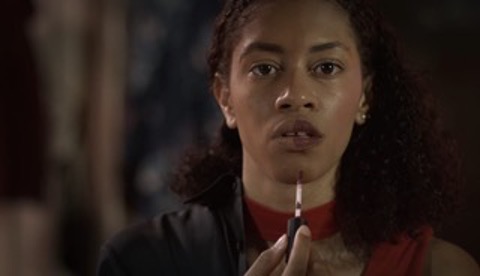 |
|
Life in a once attractive Venezuela has faded, and a man-made crisis of corruption, oppression and incompetence has led the country to being on the verge of starvation and misery. This crisis – now a global conversation – has wrung people out of the country, forcing them to find refuge elsewhere.
Venezuelan migrants are now trying to find a place to call home in new environments and are forced to adapt to new cultures and new lifestyles as means of survival. They travel distances on foot to the southern cone of Peru, Chile or Argentina, or via boat to Caribbean islands such as Trinidad and Tobago.
While some have secured documents to legally live and work in Trinidad, many have whispered their way into the country’s borders on small pirogues, traveling through the channels of the Bocas del Dragón (Dragon’s Mouths.) They penetrate themselves into society, hoping to make a better life for themselves and their families.
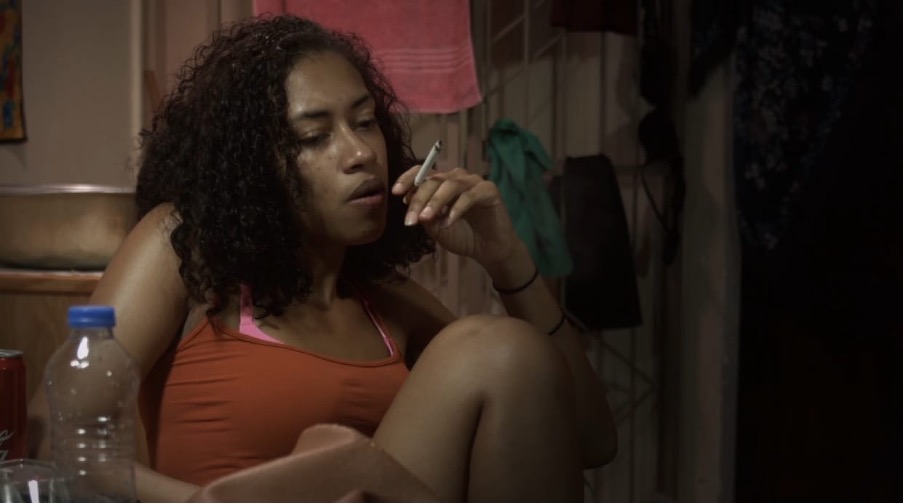
Actress Renee King in a scene from the film Mangoes from the Valley
Through research, the writer of Mangoes from the Valley, Aryana Mohammed, wrote the story of Maria. Maria can be explained as a representation of some female migrants who now live in Trinidad and may have been kidnapped, beaten and sexually assaulted by local men. In 2019, when Mohammed learnt of the first annual MICRO-Theatre Festival from Michael Cherrie, her past lecturer at the University of Trinidad and Tobago, she knew that she had to use this opportunity to tell this story. The festival was being organized by Marcus Waldron of Tout Moun Productions and its aim was to bridge the gap between migrants and locals. In using this opportunity to tell this story through a theatrical production, she would also be creating awareness about the female Venezuelan migrant crisis. “It is my small way of standing in solidarity with all my sisters who have been mistreated across the world,” she says.
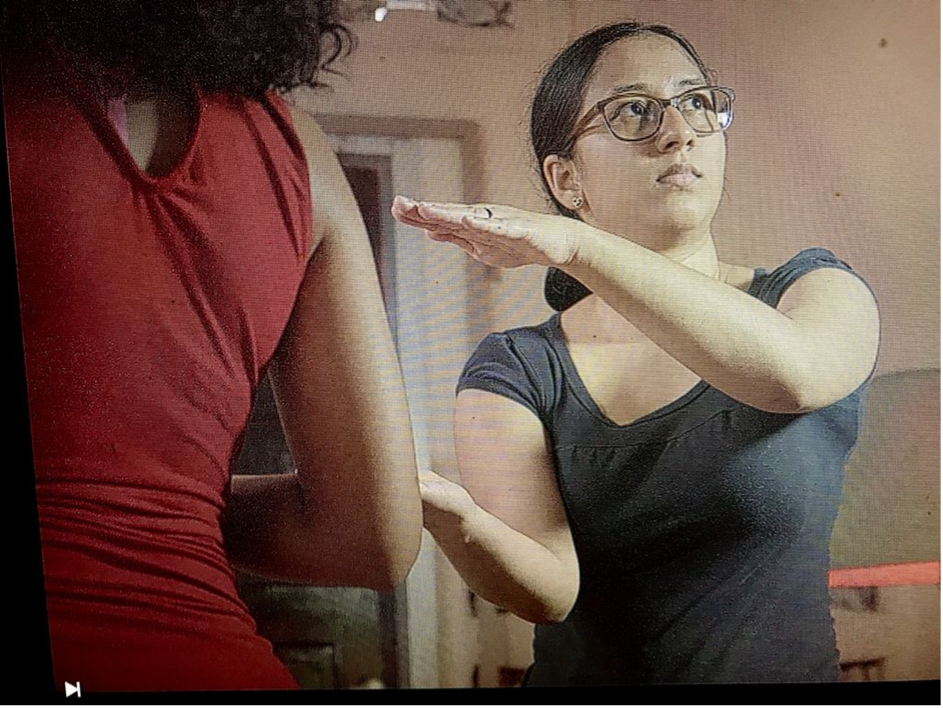
Writer/Director Aryana Mohammed
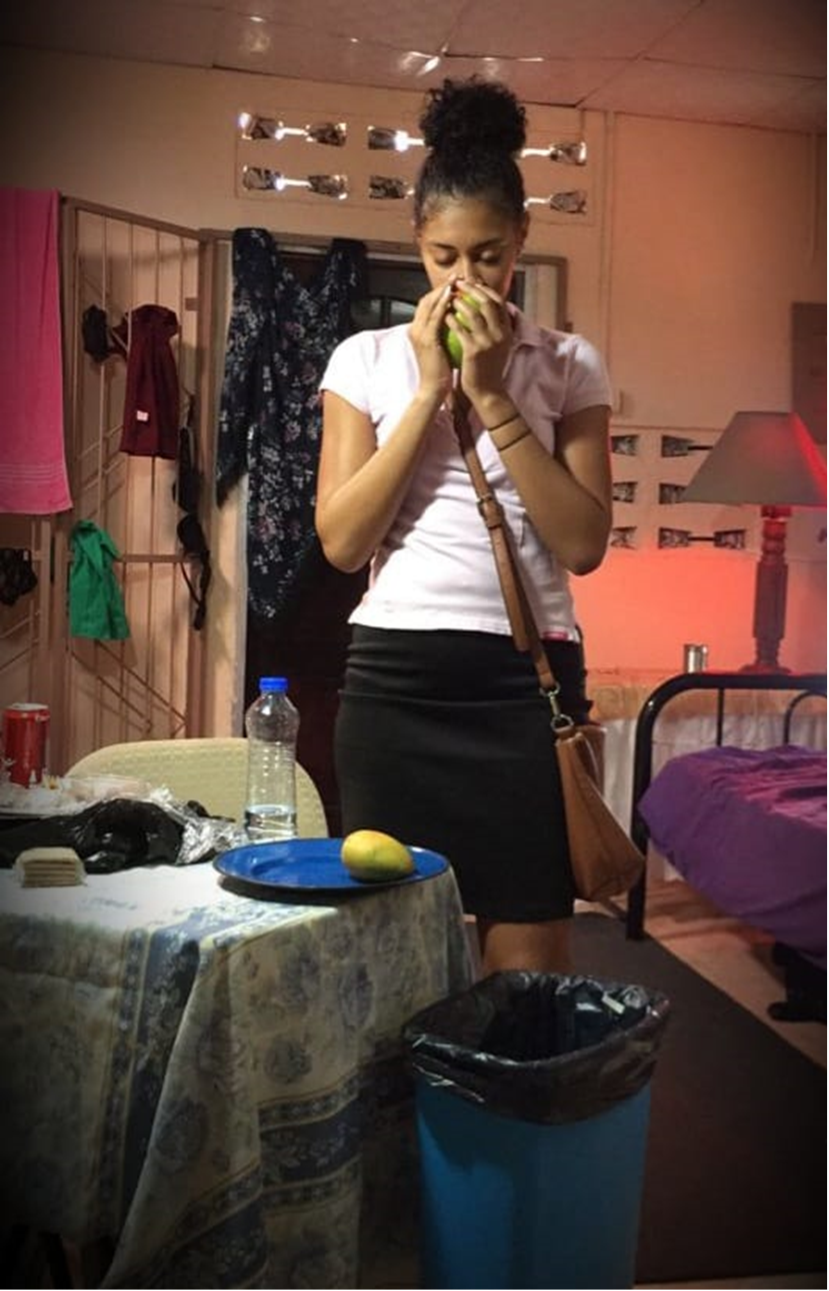
Actress Renee King in a scene from the film Mangoes from the Valley
During the festival, Mohammed’s friend Tafar Chia Lewis saw the theatrical version of Mangoes from the Valley. Tafarwould later recommend to Danielle Lewis of Junebug Productions (who was already chosen by the Toronto Fringe Festival to do a theatrical piece) to collaborate with Mohammed to showcase this relevant piece of theatre at the festival. According to Lewis, the Toronto Fringe Festival is a ‘large theatre festival.’ However, with the COVID-19 pandemic hitting globally in early 2020, the Toronto Fringe Festival was moved to online. To participate in the festival, Mangoes now had to be adapted to a film and recorded to be streamed.
With experience primarily in theatre, Mohammed now had the challenge of adapting the one-woman show, meant to be viewed live, into a film, and she had to do it without losing the intimacy and intention of the original piece.

Actress Renee King in a scene from the film Mangoes from the Valley
“To create a harmonious marriage between the two mediums required some strategy,” Mohammed shares. “From the very beginning I decided what should be our establishing shots and which elements were absolutely necessary. I was not able to put in all the elements of the theatrical performance, but the film medium did give me a chance to revisit the piece and breathe new life into it.”
Streaming the final product on the Toronto Fringe Theatre Festival, the cast and crew have successfully transformed the play into a remarkable short film. Though the audience is now separated by a digital screen on their laptop or Smart TVs rather than the imaginary fourth wall in a theatre, this doesn’t prevent you from diving into Maria’s world.
The film retains the intimacy of the original play. Minutes into the film you suspend disbelief (after all this is a factual story) and empathize with Maria (skilfully played by local actress and teacher Renee King.) You feel as if you are in the room with her – tiptoeing in her shadow, wanting to interject and save her – but you can’t. When you look at a film and it becomes so personal – the hard work of the cast and crew to translate this story with such integrity is nothing but commendable!
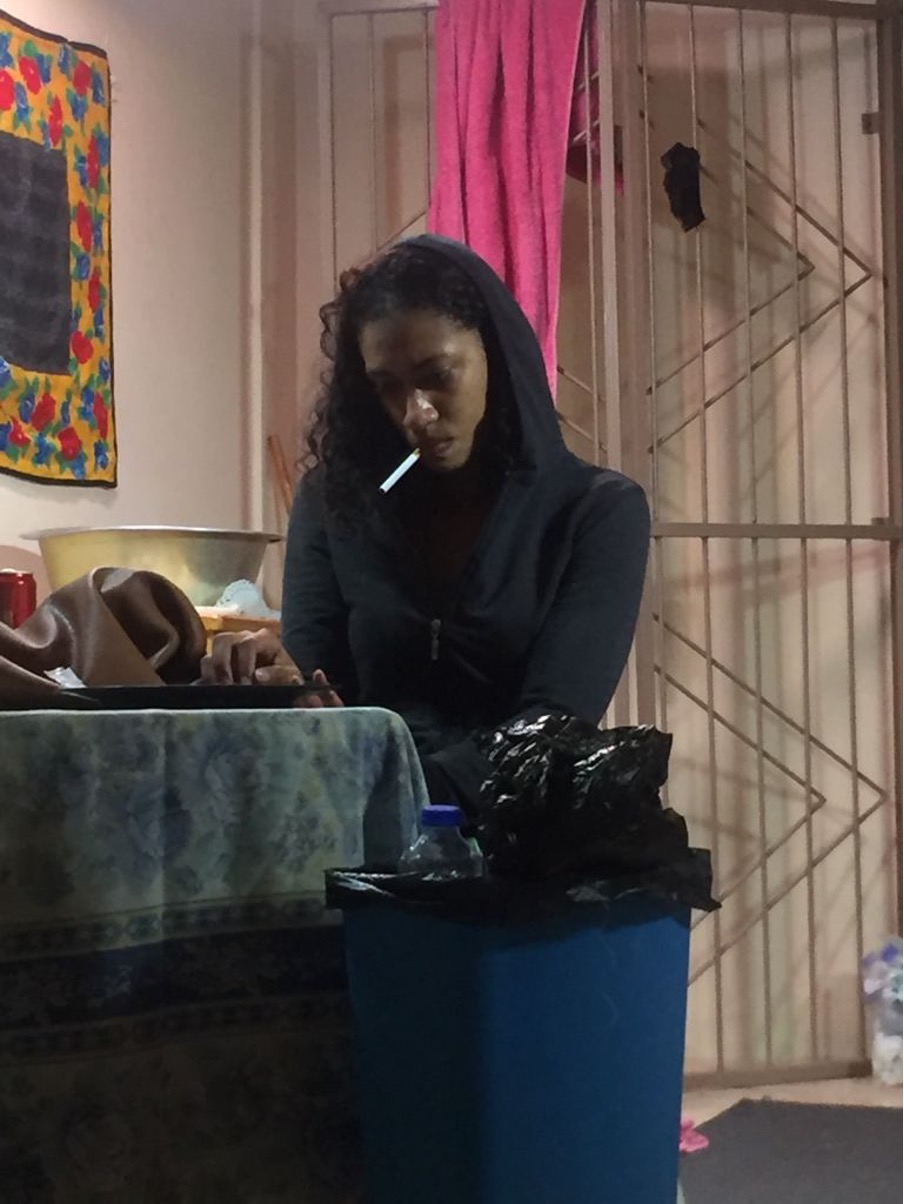
Actress Renee King in a scene from the film Mangoes from the Valley
The film’s exposition is a brief written narration granting the audience insight on the migrant crisis in Venezuela and the migrant’s journey to Trinidad. The reality is, when migrants come to Trinidad, they are offered menial jobs with sometimes unforgiving work conditions. Female migrants often turn to sex work to earn money.
We then see a dark one-bedroom studio apartment before we meet the central character, Maria. Maria enters her confined space flicking on a lone lightbulb hoping to leave behind the darkness of her day’s work behind. She stands in the doorway between the dark reality of the sunlit world outside and the room that is now her home. She contemplates her choice and the life she has now made for herself.
Is this new life the beacon of hope she envisioned when leaving her hometown of Sucre State? Not so much.
The ventilation blocks in the room are plastered with crumbled newspapers, resonating the attempt of Maria to block out every ounce of the outside world. This room is her escape from the harsh foreign land where she now exists. It is her safe place.
When she enters the room, she rids herself of everything consumed by her from the outside world. She hawks and spits repulsively into a bin – rejecting the atmosphere she inhaled. She cleanses her body with a washcloth, hoping to rid the filth beneath her skin. This is her daily routine of erasing experiences in her new life – hoping to be, well – new again. Untouched and recognizable.
Under her bed is a suitcase with her treasured possessions - fragments of herself she brought from her homeland and most likely clenched onto while journeying the rough Bocas del Dragón - determined to not lose grip and not allow it to fall and get lost in the saltiness of the sea. She pulls a rosary out of the suitcase and clenches it with the money she earned from her day’s work. She kneels in prayer – rebuking her sins, asking for forgiveness, and seeking answers from the unknown.
After prayer and securing her day’s earnings in an old tinned can, she goes to the Julie mango on a table and smells it. She smiles - the first and only time we see her smile in the film. To Maria, this mango is more than some fruit. It reminds of her home – her former safe place.

Actress Renee King in a scene from the film Mangoes from the Valley
When asked what the mango signifies to Maria, actress Renee King says, “In Venezuela, they starve, they have no food, they have to rely on what grows to sustain them sometimes. The mango is a pleasant reminder that home is a smell away. Home is near and she is not alone in the empty room.”
Maria proceeds with her daily routine by turning on the radio. Otra Vida (an original song written by Mohammed and performed by Eve Hamel-Smith) plays. She smokes a cigarette as she becomes lost in the lyrics of the song: “Quizás en otra vida/mi alma cansada/encuentre un lugar tranquilo/para descansar” meaning “Perhaps in another life/my weary soul/will find a quiet place/to rest.” As she journeys through the lyrics of the song, the butt of the cigarette loses life between her fingers, and a sense of peace and tranquillity overcomes her.
But this is short-lived.
Her phone buzzes, and her demeanour changes as she reads a text message. The sound of Otra Vida fades into the tempo of a drum. She trembles as the truth pulls her out of her daydream and she readies herself for her next client.
A knock on the door leads to a struggle between Maria and a character that is imagined by the audience – but existent to Maria. The world she tries shutting out now seeps in vehemently through the door and merges into her safe space. A choreographed scene of sexual assault reminds the viewer of the dark realities of a female migrant living and trying to survive on her own. Her struggle on the bed reveals what is pleasure for a man is a stabbing pain for a woman which she feels long after the man has left. The money earned feels like a few shillings flung at her. The damage has penetrated her so much, that the rosary no longer comforts her. The taste of mango is no longer sweet and nostalgic but rather bitter and unsavoury. All fragments of herself begin to disappear and become irrelevant, and she must find a way to be whole again.
The film is dark but honest. By the final scene you question which is worse for Maria– staying in Trinidad or returning to Venezuela.
Mangoes in the Valley is a must-see short film, as it gives the unheard a chance to speak. This is ironic as the character never speaks in the film but rather communicates non-verbally. The entire film relies on King’s movement in the confined space and her subtext. This was a cognizant choice made by Mohammed. The theatrical piece was purposely built on elements of Viewpoints – which is a technique of dance composition often used by actors to communicate using movement and gesture in a creative space. Mohammed said she made this choice as she understands the sensitivity of the topic tackled in her piece and “didn’t want words to get in the way.”
To ensure Maria’s story was clearly communicated, King spent hours of rehearsal with Mohammed and also worked on her own.
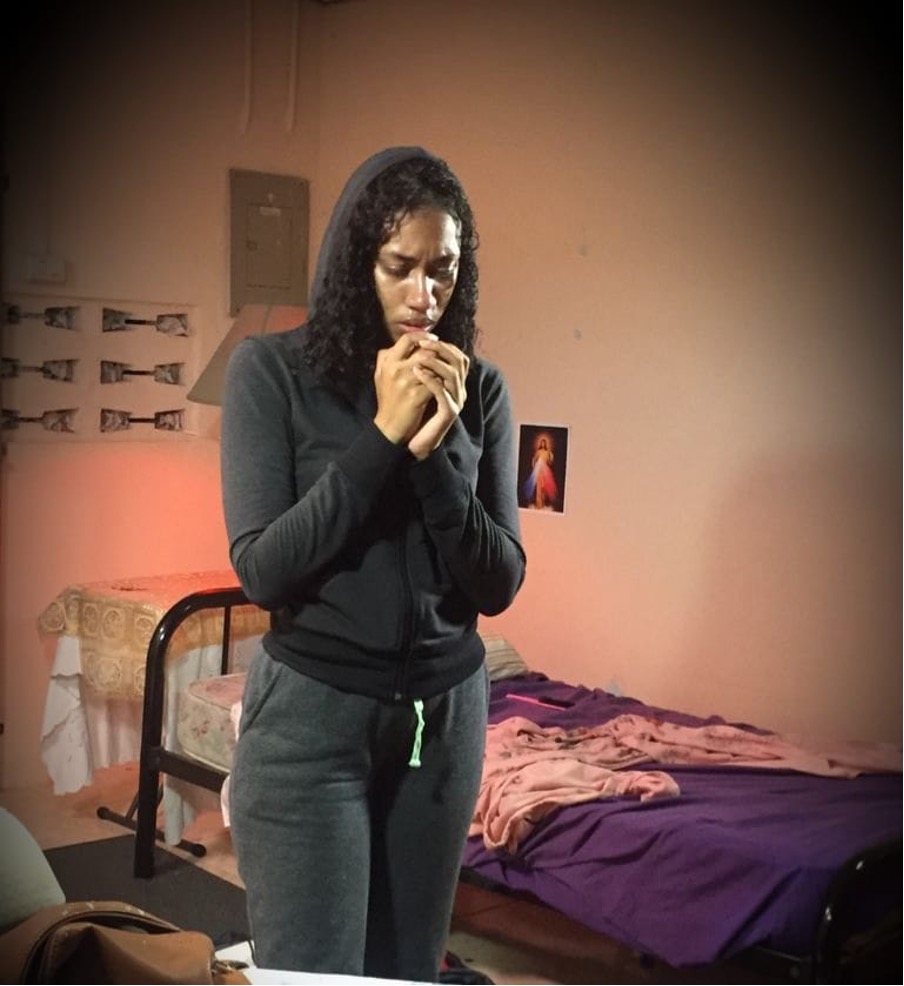
Actress Renee King in a scene from the film Mangoes from the Valley
“I felt most connected when the room was silent, when I could hear myself breathe, when I felt alone,” King says. “So taking mental breaks helped me to ground myself and assisted in the characterization as it translated on screen. Only when I questioned myself and challenged myself was I able to question my character and connect to her. The audience was now seeing me through a lens. I had to ensure that my thoughts showed in the simplest ways, and nothing seemed overdone. Shooting this piece and discovering new things about my character was also a part of the process of how the character was depicted.”
Although the film is based on a Venezuelan migrant, the film is universal. King makes it clear that this could be a room anywhere in the world. “This is a representation of any and every woman who has been taken advantage of no matter their geographical location. The message could be a number of things; to me it shows you what can happen if you do not allow yourself to let go. If you do not forgive yourself for being a victim, if you do not recognize that replaying bad memories in your head does not help you overcome. Healing is a choice. Healing is definite. We may be stuck wherever we are, but it is our mind that is truly imprisoned if we are constantly fighting ourselves or the many things that have happened to us. Our trauma is not our fault but the way we choose to deal with that trauma either makes us or breaks us.”
The cast and crew were successful in keeping the integrity of the original piece as the relationship between the actor and the audience remains – hence making it a true theatrical experience. Excluding dialogue allows audiences to interpret the film in many ways and arrive at their own conclusion. King’s personalization of the story invites you to live and experience moment-by-moment the life of Maria – cementing the unavoidable truth of the hardships faced because of the Venezuela crisis.
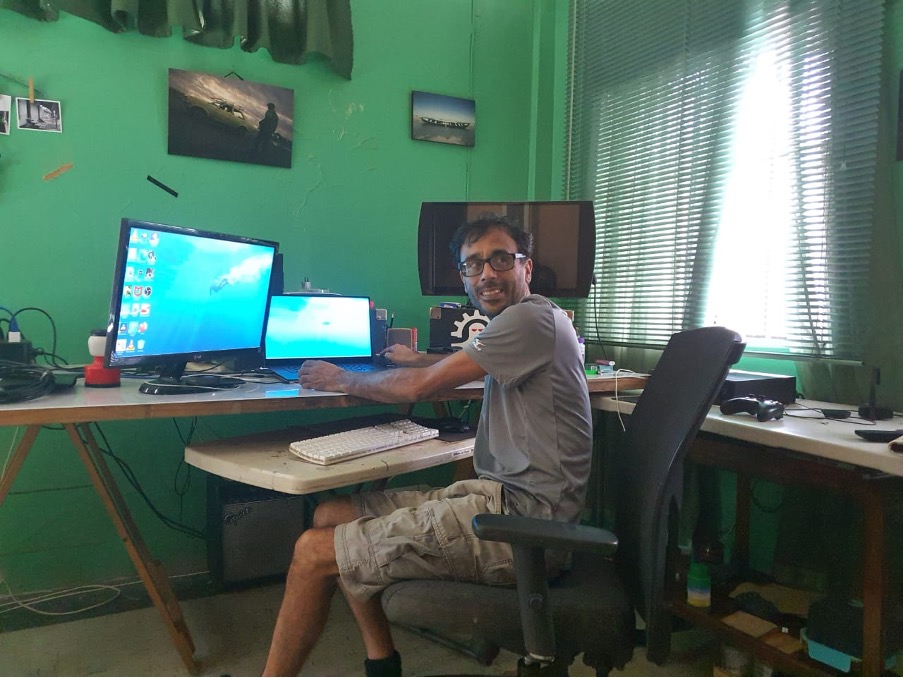
Videographer Sean Edghill
Mangoes is a triumph not only because of the content and hard work of the cast and crew, but also it is a film that was produced during a pandemic despite many delays in filming with restrictions and lockdown. As audiences are left to interpret the film in different ways, it can be agreed upon that a main theme of the film is the resilience of the human spirit. We always find a way to survive no matter how life may chew and spit us out sometimes. This theme is symbolic with the film in itself. With the release of Mangoes, it is reassurance that no matter how much turmoil the world may be in, theatre is as eager as the human spirit and will find a way to re-emerge and exist, serving as a vital part of society.
Mangoes from the Valley is a 21-minute dramatic short film playing until August 15th 2021 on the Toronto Fringe Film Festival. A $5 CAD Membership fee is required to view the short film and you can also contribute monetarily towards the artistes involved. It can be accessed by clicking on this link: https://fringetoronto.com/digital-fringe/show/mangoes-valley
Director
Aryana Mohammed
Cast
Renee King
Producer
Danielle Lewis
Videographer
Sean Edghill
Nigel Thompson
Editor
Sean Edghill
Eve Hamel-Smith
Stage Manager
Danielle Lewis
Set Designer
Aryana Mohammed
Danielle Lewis
Musician(s)
Eve Hamel-Smith (Vocals & sound production)
Aryana Mohammed (Lyrics)
Romario Bruce Salina (Maracas & guitar)
All photographs are courtesy of Aryana Mohammed.
 |
By: Vedesh Nath | FEATURES | August 2021 |
Tweet |
Warning: array_search() expects parameter 2 to be array, null given in /home/paradisepulsea/public_html/pages/article.php on line 87
Warning: in_array() expects parameter 2 to be array, null given in /home/paradisepulsea/public_html/pages/article.php on line 104
Warning: array_search() expects parameter 2 to be array, null given in /home/paradisepulsea/public_html/pages/article.php on line 87
Warning: in_array() expects parameter 2 to be array, null given in /home/paradisepulsea/public_html/pages/article.php on line 104
Warning: array_search() expects parameter 2 to be array, null given in /home/paradisepulsea/public_html/pages/article.php on line 87
Warning: in_array() expects parameter 2 to be array, null given in /home/paradisepulsea/public_html/pages/article.php on line 104


| Subscribe |










%20-%20Copy.jpg)

